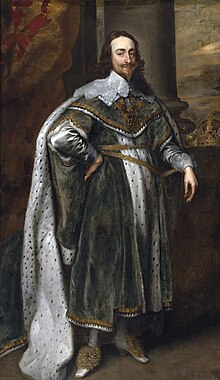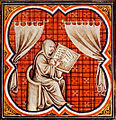Portal:Biography
The Biography Portal
A biography, or simply bio, is a detailed description of a person's life. It involves more than just basic facts like education, work, relationships, and death; it portrays a person's experience of these life events. Unlike a profile or curriculum vitae (résumé), a biography presents a subject's life story, highlighting various aspects of their life, including intimate details of experience, and may include an analysis of the subject's personality.
Biographical works are usually non-fiction, but fiction can also be used to portray a person's life. One in-depth form of biographical coverage is called legacy writing. Works in diverse media, from literature to film, form the genre known as biography.
An authorized biography is written with the permission, cooperation, and at times, participation of a subject or a subject's heirs. An autobiography is written by the person themselves, sometimes with the assistance of a collaborator or ghostwriter. (Full article...)
Featured biographies –
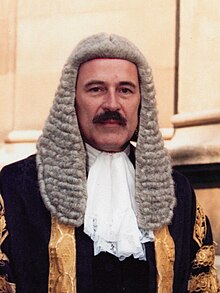
Robert Lionel Archibald Goff, Baron Goff of Chieveley, PC, FBA (12 November 1926 – 14 August 2016) was an English barrister and judge who was Senior Lord of Appeal in Ordinary, the equivalent of today's President of the Supreme Court. Best known for establishing unjust enrichment as a branch of English law, he has been described by Andrew Burrows as "the greatest judge of modern times". Goff was the original co-author of Goff & Jones, the leading English law textbook on restitution and unjust enrichment, first published in 1966. He practised as a commercial barrister from 1951 to 1975, following which he began his career as a judge. He was appointed to the Judicial Committee of the House of Lords in 1986.
Goff was born in his mother's family home in Perthshire, Scotland, and was raised in Hampshire, England. He obtained a place at New College, Oxford, but was called up in December 1944 and served in the Scots Guards in Italy until going to Oxford in October 1948. He earned a first-class degree in Jurisprudence there, and three weeks after receiving his examination results was offered a fellowship at Oxford. He accepted this on condition that he could be called to the Bar first. He was called to the Bar at the Inner Temple in 1951, and appointed fellow and tutor at Lincoln College, Oxford, and a university lecturer in Jurisprudence in 1952. He was High Steward of the University of Oxford from 1991 to 2001. (Full article...)
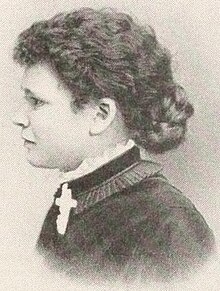
Cora Agnes Benneson (June 10, 1851 – June 8, 1919) was an American attorney, lecturer, and writer. She was one of the first women to practice law in New England. Benneson was raised in Quincy, Illinois, to parents involved in local politics, religious organizing, and philanthropy; her parents regularly invited prominent guests to their home, including the writers and philosophers Amos Bronson Alcott and Ralph Waldo Emerson. Benneson began her university studies in 1875 at the University of Michigan, where she earned a Bachelor of Arts in 1878, a Bachelor of Laws in 1880, and a Master of Arts in 1883. After earning her master's degree, she was admitted to the bars of Illinois and Michigan.
From 1883 to 1885, Benneson traveled the world to learn about legal cultures, and in particular how they affected women; however, she often took a nativist and racist or stereotypical view of those cultures. When she returned to the United States, Benneson undertook a nationwide lecture tour to speak about her travels and observations. In 1886, she briefly worked as an editor of West Publishing's law reports before taking up a history fellowship at Bryn Mawr College under then-professor Woodrow Wilson. (Full article...)
Shefali Shah (née Shetty, 22 May 1973) is an Indian actress of film, television and theatre. Working primarily in independent Hindi films, she has received multiple local and foreign accolades for her performances. Shah's acting career started on the Gujarati stage before she debuted on television in 1993. After small parts on television and a brief stint with cinema in Rangeela (1995), she gained wider recognition in 1997 for her role in the popular series Hasratein. This was followed by lead roles in the TV series Kabhie Kabhie (1997) and Raahein (1999). A supporting role in the crime film Satya (1998) won her positive notice and a Filmfare Critics Award, and she soon shifted her focus to film acting starting with a lead role in the Gujarati drama Dariya Chhoru (1999).
Shah was selective about her roles through the following decades, resulting in intermittent film work, mostly in character parts and often to appreciation from critics. She appeared in the international co-production Monsoon Wedding (2001) and the mainstream comedy-drama Waqt: The Race Against Time (2005). In 2007, her portrayal of Kasturba Gandhi in the biographical drama Gandhi, My Father won her the Best Actress prize at the Tokyo International Film Festival, and she received the National Film Award for Best Supporting Actress for the drama film The Last Lear. Among her subsequent film roles, she played a leading part in Kucch Luv Jaisaa (2011) and was noted for her work in the social problem film Lakshmi (2014) and the ensemble drama Dil Dhadakne Do (2015). (Full article...)

Between 1769 and 1773, the young Wolfgang Amadeus Mozart and his father Leopold Mozart made three Italian journeys. The first, an extended tour of 15 months, was financed by performances for the nobility and by public concerts, and took in the most important Italian cities. The second and third journeys were to Milan, for Wolfgang to complete operas that had been commissioned there on the first visit. From the perspective of Wolfgang's musical development the journeys were a considerable success, and his talents were recognised by honours which included a papal knighthood and memberships in leading philharmonic societies.
Leopold Mozart had been employed since 1747 as a musician in the Archbishop of Salzburg's court, becoming deputy Kapellmeister in 1763, but he had also devoted much time to Wolfgang's and sister Nannerl's musical education. He took them on a European tour between 1763 and 1766, and spent some of 1767 and most of 1768 with them in the imperial capital, Vienna. The children's performances had captivated audiences, and the pair had made a considerable impression on European society. By 1769, Nannerl had reached adulthood, but Leopold was anxious to continue 13-year-old Wolfgang's education in Italy, a crucially important destination for any rising composer of the 18th century. (Full article...)
George III (George William Frederick; 4 June 1738 – 29 January 1820) was King of Great Britain and Ireland from 25 October 1760 until his death in 1820. The Acts of Union 1800 unified Great Britain and Ireland into the United Kingdom of Great Britain and Ireland, with George as its king. He was concurrently Duke and Prince-elector of Hanover in the Holy Roman Empire before becoming King of Hanover on 12 October 1814. He was a monarch of the House of Hanover, who, unlike his two predecessors, was born in Great Britain, spoke English as his first language, and never visited Hanover.
George was born during the reign of his paternal grandfather, King George II, as the first son of Frederick, Prince of Wales, and Princess Augusta of Saxe-Gotha. Following his father's death in 1751, Prince George became heir apparent and Prince of Wales. He succeeded to the throne on George II's death in 1760. The following year, he married Princess Charlotte of Mecklenburg-Strelitz, with whom he had 15 children. George III's life and reign were marked by a series of military conflicts involving his kingdoms, much of the rest of Europe, and places farther afield in Africa, the Americas and Asia. Early in his reign, Great Britain defeated France in the Seven Years' War, becoming the dominant European power in North America and India. However, Britain lost 13 of its North American colonies in the American War of Independence. Further wars against revolutionary and Napoleonic France from 1793 concluded in the defeat of Napoleon at the Battle of Waterloo in 1815. In 1807, the transatlantic slave trade was banned from the British Empire. (Full article...)
John Sherman Cooper (August 23, 1901 – February 21, 1991) was an American politician, jurist, and diplomat from the United States. He served three non-consecutive, partial terms in the United States Senate before being elected to two full terms in 1960 and 1966, representing Kentucky. He also served as U.S. Ambassador to India from 1955 to 1956 and U.S. Ambassador to East Germany from 1974 to 1976. He was the first Republican to be popularly elected to more than one term as a senator from Kentucky and, in both 1960 and 1966, he set records for the largest victory margin for a Kentucky senatorial candidate from either party.
Cooper's first political service was as a member of the Kentucky House of Representatives from 1928 to 1930. In 1929, he was elected county judge of Pulaski County. After a failed gubernatorial bid in 1939, he joined the U.S. Army in 1942. During World War II, he earned the Bronze Star Medal for reorganizing the Bavarian judicial system after the allied victory in Europe. While still in Germany, he was elected circuit judge for Kentucky's 28th circuit. He returned home to accept the judgeship, which he held for less than a year before resigning to seek election to A. B. "Happy" Chandler's vacated seat in the U.S. Senate. He won the seat by 41,823 votes, the largest victory margin by any Republican for any office in Kentucky up to that time. (Full article...)
William Bradley Pitt (born December 18, 1963) is an American actor and film producer. He is the recipient of various accolades, including three Academy Awards, two British Academy Film Awards, two Golden Globe Awards, and a Primetime Emmy Award. One of the most influential celebrities, Pitt appeared on Forbes' annual Celebrity 100 list from 2006 to 2008, and the Time 100 list in 2007.
Pitt first gained recognition as a cowboy hitchhiker in the Ridley Scott road film Thelma & Louise (1991). His first leading roles in big-budget productions came with the drama films A River Runs Through It (1992) and Legends of the Fall (1994). He also starred in the horror film Interview with the Vampire (1994), alongside Tom Cruise. He gave critically acclaimed performances in David Fincher's crime thriller Seven (1995) and the science fiction film 12 Monkeys (1995). The latter earned him a Golden Globe Award for Best Supporting Actor and his first Academy Award nomination. (Full article...)

Lawrence Winchester Wetherby (January 2, 1908 – March 27, 1994) was an American politician who served as Lieutenant Governor and Governor of Kentucky. He was the first of only two governors in state history born in Jefferson County, despite the fact that Louisville (the county seat) is the state's most populous city. The second governor born in Jefferson County is the incumbent governor, Andy Beshear.
After graduating from the University of Louisville, Wetherby held several minor offices in the Jefferson County judicial system before being elected lieutenant governor in 1947. He was called Kentucky's first "working" lieutenant governor because Governor Earle C. Clements asked him to carry out duties beyond his constitutional responsibility to preside over the state Senate, such as preparing the state budget and attending the Southern Governors Conference. In 1950, Clements resigned to assume a seat in the U.S. Senate, elevating Wetherby to governor. Wetherby won immediate acclaim by calling a special legislative session to increase funding for education and government benefits from the state's budget surplus. In 1951, he won a four-year full term as governor, during which he continued and expanded many of Clements' programs, including increased road construction and industrial diversification. He endorsed the Supreme Court's 1954 desegregation order in the case of Brown v. Board of Education and appointed a biracial commission to oversee the successful integration of the state's schools. As chairman of the Southern Governors Conference in 1954 and 1955, he encouraged other southern governors to accept and implement desegregation. (Full article...)
Philip I Epiphanes Philadelphus (Ancient Greek: Φίλιππος Ἐπιφανής Φιλάδελφος; between 124 and 109 BC–83 or 75 BC) was a Hellenistic Seleucid monarch who reigned as the king of Syria from 94 to either 83 or 75 BC. The son of Antiochus VIII and his wife Tryphaena, he spent his early life in a period of civil war between his father and his uncle Antiochus IX. The conflict ended with the assassination of Antiochus VIII; Antiochus IX took power in the Syrian capital Antioch, but soon fell in battle with Antiochus VIII's eldest son Seleucus VI.
After the murder of Seleucus VI in 94 BC, Philip I became king with his twin brother Antiochus XI, and planned to avenge Seleucus VI. In 93 BC Antiochus XI took Antioch from Antiochus IX's son Antiochus X. Antiochus XI became the senior king, and Philip I remained in a base in Cilicia. Antiochus X returned and killed Antiochus XI that year. Philip I then allied with his younger brother Demetrius III, who was based in Damascus. Antiochus X was probably killed in 88 BC. Demetrius III took the capital and besieged Philip I in Beroea (Aleppo), but the latter prevailed and took Antioch; their youngest brother Antiochus XII took Damascus. (Full article...)
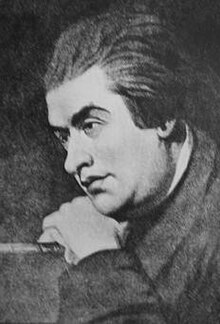
Samuel Johnson (18 September 1709 [O.S. 7 September] – 13 December 1784) was an English author born in Lichfield, Staffordshire. He was a sickly infant who early on began to exhibit the tics that would influence how people viewed him in his later years. From childhood he displayed great intelligence and an eagerness for learning, but his early years were dominated by his family's financial strain and his efforts to establish himself as a school teacher.
After a year spent studying at Pembroke College, Oxford, Johnson was forced to leave by lack of financial support. He tried to find employment as a teacher, but was unable to secure a long-term position. In 1735 he married Elizabeth "Tetty" Porter, a widow 20 years older than himself, and the responsibilities of this marriage made him determined to succeed as an educator. He established his own school, but the venture was unsuccessful. Thereafter, leaving his wife behind in Lichfield, he moved to London, where he spent the rest of his life. In London he began writing essays for The Gentleman's Magazine, and also befriended Richard Savage, a notorious rake and aspiring poet who claimed to be the disavowed son of a nobleman. Eventually he wrote the Life of Mr Richard Savage, his first successful literary biography. He also wrote the powerful poem London, an 18th-century version of Juvenal's Third Satire, as well as the tragic drama Irene, which was not produced until 1749, and even then was not successful. (Full article...)

Ernest Edward Mills Joyce AM (c. 1875 – 2 May 1940) was a Royal Naval seaman and explorer who participated in four Antarctic expeditions during the Heroic Age of Antarctic Exploration, in the early 20th century. He served under both Robert Falcon Scott and Ernest Shackleton. As a member of the Ross Sea party in Shackleton's Imperial Trans-Antarctic Expedition, Joyce earned an Albert Medal for his actions in bringing the stricken party to safety, after a traumatic journey on the Great Ice Barrier. He was awarded the Polar Medal with four bars, one of only two men to be so honoured, the other being his contemporary, Frank Wild.
Joyce came from a humble seafaring background and began his naval career as a boy seaman in 1891. His Antarctic experiences began 10 years later, when he joined Scott's Discovery Expedition as an Able Seaman. In 1907 Shackleton recruited Joyce to take charge of dogs and sledges on the Nimrod Expedition. Subsequently, Joyce was engaged in a similar capacity for Douglas Mawson's Australasian Antarctic Expedition in 1911, but left the expedition before it departed for the Antarctic. In 1914 Shackleton recruited Joyce for the Ross Sea party; despite his heroics this expedition marked the end of Joyce's association with the Antarctic, and of his exploring career, although he made repeated attempts to join other expeditions. (Full article...)
Honoré de Balzac (/ˈbælzæk/ BAL-zak, more commonly US: /ˈbɔːl-/ BAWL-, French: [ɔnɔʁe d(ə) balzak]; born Honoré Balzac; 20 May 1799 – 18 August 1850) was a French novelist and playwright. The novel sequence La Comédie humaine, which presents a panorama of post-Napoleonic French life, is generally viewed as his magnum opus.
Owing to his keen observation of detail and unfiltered representation of society, Balzac is regarded as one of the founders of realism in European literature. He is renowned for his multi-faceted characters; even his lesser characters are complex, morally ambiguous and fully human. Inanimate objects are imbued with character as well; the city of Paris, a backdrop for much of his writing, takes on many human qualities. His writing influenced many famous writers, including the novelists Émile Zola, Charles Dickens, Marcel Proust, Gustave Flaubert, and Henry James, and filmmakers François Truffaut and Jacques Rivette. Many of Balzac's works have been made into films and continue to inspire other writers. James called him "really the father of us all." (Full article...)



